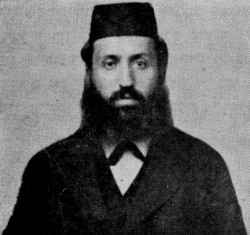 |
|
|
[Page 86]
by Shepsl Kaplan
Rabbi Reuben Khodesh was one of the most involved and attractive figures among the Olshan rabbis. He was the religious and spiritual leader of the Olshan community, and was chosen from many candidates for the position. Other towns had sought him but he remained devoted to Olshan. He quickly became popular in the whole Vilna region. Although other congregations sought him, he remained dedicated to the old–fashioned good Jews of Olshan, to whom he devoted his body and soul. He was much admired and loved by young and old, religious and unaffiliated, all admired his religious–worldly outlook. He was also gifted with unusual speaking talent. His speeches were always clear, logical and comprehensible to all. His words were deeply inscribed into their hearts.
Cantors, Singers and Prayer Leaders
There were two large synagogues in Olshan which always had good singers and cantors.–Elihu Gurvitch, (wonderful tenor), Gershon Abramovitch, brother of the famous cantor Lazar Abramovitch of Smorgen, Simon Segalovitch, Isaac Gershon, Chaim Gurevitch, Herschel the Teacher, also called ‘The Turk’. For many years Olshan Jews enjoyed the heart–felt prayers of Cantor Yitchok Gershon. With the assembled choirs, they sang the complicated liturgical compositions, also those locally composed. At holiday times, the synagogue was packed, even Christians came to hear the music of the cantor and his choir.
by Pesakh Gershonovitch
Near the flowing ‘Jewish stream’, as it was called, which never dried up, stood both the old Beys Hamidrash and the new one. They were always filled with people united in prayer. Rabbi Khodesh fulfilled his good works, supporting on his shoulders the poorest Olshaners. He sought help from his congregation for philanthropy, including the poverty stricken brides who had been overburdened by the expenses of their weddings. There was never any lack of needy persons.
When a traveler's horse fell, a room was found for the family, funds were collected within a week to buy a second horse, and the wheels continued to roll. R' Issar Polanski, after years in Olshan, became the chief rabbi in Vilna. Others ended in Vishniev and Novogrodsk.
|
|
Other distinguished rabbis are described, performing remarkable and moving prayer rituals at Rosh Hashonah, Kol Nidrei, Yom Kippur. Cantor Shpira used to move the congregation to tears with his singing. R. Khodesh stood wrapped in his white robe and tallies at Kol Nidrei, and it seemed as if the heavens would part. Gershon Abramovitch, Moshe Yosef Soleducha and Avrohom Yitzchok Soleducha always assisted.
At Mincha and Maariv, the Jews sat at a long table, and listened to Meyer Gurvitch recite a verse from ‘Chai Odom’. Suddenly this was interrupted by a loud bang on the table– Lasar Abramovitch had called out “It's Maariv prayer time!” After Maariv, the scholars sat studying Gemorah until late in the night. On Friday nights of course, all were greeted by “Gut Shabbos, Gut Shabbos”. On Shabbos morning, old and young, rich and poor, prayed for a better week. During the Torah reading, there was some chatter of world politics or business matters, but then the shamesh called , “Enough!”, all became silent, and listened to the rabbi's teaching about the Torah portion.
The synagogue was thoroughly painted beautifully by the artist–painter Avrohom Shlomo Varonovski. The old Beys Hamidrash was divided –one section for services, the larger one for the school. Olshan always emanated Jewishness. No matter how difficult, the whole congregation had preserved what was precious and holy.
Reb Moshe Soleducha– taught us, in summer Pirkei Ovos, in winter Borchi Nafshi. His calm manner, his neat beard, his whole person elicited deep respect; he seemed the image of Reb Herzl. We treasured his every word. He died too young, in America.
by A.A. Potashnik
Erev Shabbos started on Thursday when the housewives come to market to buy meat. Names of the merchants are listed. Friday noon, housewives are busy with baking, cooking, house cleaning, washing the children's hair. The air is laden with the baking aromas. In the mild afternoon, a fiddler plays nigunim. A wedding chuppah is erected in the afternoon, customary in Olshan. Bride and groom are ushered into the shul, with music by klezmorim, usually from Oshmen. Later comes Beryl, the ‘Kaiser, a revolutionary of 1905, who proclaims that Shabbos is about to begin. “Jews, go to shul!”, and he reminds the shopkeepers to close their shops.
Dina Potashnik was concerned with collecting money, challah for the needy. After she was finished for the week, she wore her Shabbos dress with a pearl string around her neck.
Friday evening all the business has ceased, shops are closed, market cleaned. From all the streets and alleys the Jews, with solemn tread, enter the shul to be greeted by the rabbi with his luminous face and proud stance. Friday night, everyone has come home from shul, they make kiddush, the Shabbos candles are lit for the table, and shine on the street. The house lights gradually dim. Most of the elders go to sleep, the youngsters go walking in the street, gather in their particular groups, discuss the news, amusements, sing the latest Eretz Israel songs. Their singing fills the streets with joy and hope. Groups are strolling on the sidewalk near the cathedral, and there's some flirting between the boys and girls. Such is a typical summer Friday in Olshan.
|
|
|
|
|
JewishGen, Inc. makes no representations regarding the accuracy of
the translation. The reader may wish to refer to the original material
for verification.
JewishGen is not responsible for inaccuracies or omissions in the original work and cannot rewrite or edit the text to correct inaccuracies and/or omissions.
Our mission is to produce a translation of the original work and we cannot verify the accuracy of statements or alter facts cited.
 Halshany, Belarus
Halshany, Belarus
 Yizkor Book Project
Yizkor Book Project
 JewishGen Home Page
JewishGen Home Page
Copyright © 1999-2026 by JewishGen, Inc.
Updated 16 Nov 2015 by JH